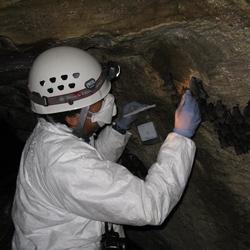Michael Runge, Ph.D.
Michael Runge is a research ecologist at the USGS Eastern Ecological Science Center in Kearneysville, WV.
Michael has worked at the Eastern Ecological Science Center since 1999.
Professional Experience
2001-present Research Ecologist at USGS Eastern Ecological Science Center (Previously Patuxent Wildlife Research Center)
2009 to 2010 visiting scientist at the University of Melbourne, School of Botany
1989 to 1994 taught math and science at St. Francis High School in Louisville, Kentucky
Education and Certifications
B.A. in biology and philosophy (1989) from the Johns Hopkins University
M.A.T. (Master of Arts in Teaching) in biology (1994) from Spalding University
Ph.D. in wildlife science (1999),with minors in biometrics and agricultural economics, from Cornell University
Honors and Awards
Regional Director’s Award for Excellence in Communication. USGS Western Region. November 2007. “In recognition of outstanding science leading to enhanced understanding of the relation bet
Unit Award for Excellence of Service. U.S. Department of Interior. November 2007. In recognition of the outstanding contributions of the International Polar Bear Science Team
Unit Award for Excellence of Service. U.S. Department of Interior. September 2007. In recognition of introducing the adaptive management initiative across the Department
Regional Director’s Conservation Award, USFWS Region 4. May 2007. For contributions to and partnership in the science and recovery efforts of the Florida manatee.
Extraordinary Contribution. Chief, National Wildlife Refuge System, USFWS. June 2003. For extraordinary contributions to Fulfilling the Promise.
Superior Service Award. United States Department of Interior. October 2005. For making your science available to natural resource managers for use in their management decisions
STAR Award - USFWS Region 5. June 2004. For outstanding contributions to improving wildlife management science on National Wildlife Refuges
STAR Award - USGS. August 2003. For supporting the USFWS in the manatee incidental take rule-making.
STAR Award - PWRC, U.S. Geological Survey. January 2002. For helping organize and present the Adaptive Management Workshop at the 2001 Wildlife Society Meeting.
STAR Award - PWRC, U.S. Geological Survey. January 2002. For helping organize and present the Adaptive Management Workshop at the 2001 Wildlife Society Meeting.
Gamma Sigma Delta. Cornell University. Election, May 1998.
Delta Epsilon Sigma. Spalding University. Election, April 1994.
Phi Beta Kappa. Johns Hopkins University. Election, March 1988.
Presidential Scholar. The White House. June 1985.













